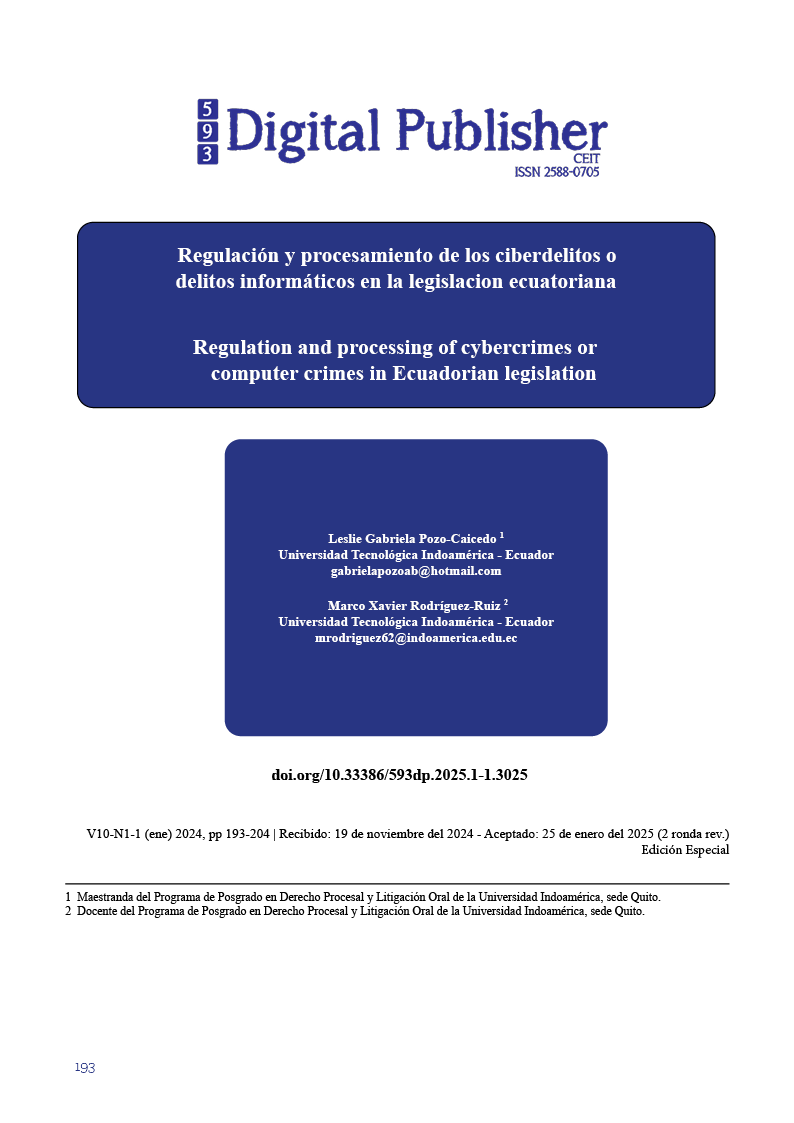Regulation and processing of cybercrimes or computer crimes in Ecuadorian legislation
Main Article Content
Abstract
The investigation was developed on the regulatory and legal situation of computer crimes in Ecuador, their classification, established sanctions and the process for their investigation and prosecution, in perspective of the advancement of technology and the sufficiency of the norm. A topic whose importance is related, not only to its sanction, but also to the understanding of the management and protection of data and information as people's rights. By virtue of this, the research question is: What are the main deficiencies of the COIP in terms of the regulation and processing of cybercrimes?, and as an objective, to raise the main deficiencies of the COIP in terms of cybercrimes that They put at risk different protected legal assets and their possible solutions to safeguard their well-being. Within the main points of analysis, the following cybercrimes or computer crimes, digital evidence, current regulations and related practical cases were addressed. To achieve this, the methodology used had a qualitative approach, descriptive level, legal hermeneutic, inductive and deductive methods, and techniques such as documentary analysis and practical cases. The results are Ecuador's position regarding computer crimes and, unfortunately, the needs and shortcomings are evident to satisfactorily cover the prosecution and punishment of these crimes in the face of an investigation lacking resources, as well as a lack of training and means to comply. with legal certainty and effective judicial protection of rights and guarantees against illicit conduct in the technological and information field.
Downloads
Article Details

This work is licensed under a Creative Commons Attribution-NonCommercial-ShareAlike 4.0 International License.
1. Derechos de autor
Las obras que se publican en 593 Digital Publisher CEIT están sujetas a los siguientes términos:
1.1. 593 Digital Publisher CEIT, conserva los derechos patrimoniales (copyright) de las obras publicadas, favorece y permite la reutilización de las mismas bajo la licencia Licencia Creative Commons 4.0 de Reconocimiento-NoComercial-CompartirIgual 4.0, por lo cual se pueden copiar, usar, difundir, transmitir y exponer públicamente, siempre que:
1.1.a. Se cite la autoría y fuente original de su publicación (revista, editorial, URL).
1.1.b. No se usen para fines comerciales u onerosos.
1.1.c. Se mencione la existencia y especificaciones de esta licencia de uso.
References
ACOSTA, M., BENAVIDES, M. GARCÍA, N. (2020). Delitos informáticos: Impunidad organizacional y su complejidad en el mundo de los negocios. Revista Venezolana de Gerencia
ACUARIO, S. (2016). Delitos Informáticos: Generalidades.
APARICIO, V. (2022). Delitos informáticos en Ecuador según el COIP: un análisis documental.
CARAGUAY, S. (2020). Aplicación de informática forense en auditorías gubernamentales para la determinación de indicios de responsabilidad penal con delitos informáticos en Ecuador, México y Perú, 2007-2019
CARRERA, F., QUILLIGANA, J., AGUILAR, M., FIALLOS, S. (2019). Desafío de la ciberseguridad ante la legislación penal.
CURTIS, J., OXBURGH, G. (2022). Understanding cybercrime in ‘real world’policing and law enforcement. The Police Journal, 0(0), Ahead of Print. https://doi. org/10.1177/0032258X221107584
ENRÍQUEZ, J., ALVARADO, Y. (2015). Los delitos informáticos y su penalización en el código orgánico integral penal ecuatoriano.
GÓMEZ, D. (2020). Implicaciones jurídicas de la evidencia digital en el proceso judicial colombiano. Ratio Juris: 220-240
JARA, L., FERRUZOLA, E., RODRÍGUEZ, G. (2017). Delitos a través redes sociales en el Ecuador: una aproximación a su estudio | I+D Tecnológico.
LÓPEZ, J. (2022). Sobre el alcance de los fines de la pena en el fenómeno criminal de la ciberdelincuencia. Revista Chilena de Derecho y Tecnología
MAYER, L., CALDERÓN, G. (2020). El delito de fraude informático: concepto y delimitación. Revista Chilena de Derecho y Tecnología
RODAS, P., LOOR, E. (2018). Proceso de formación en tipificación en el código orgánico integral penal para los delitos cibernéticos.
SACA, H., MARQUEZ, A., ARCINIEGAS, C. (2023) La Inviabilidad de la Prueba Digital por Falta de Regulación en los Delitos Informáticos.
SALTOS, ROBALINO, PAZMIÑO,. (2021).Análisis conceptual del delito informático en Ecuador. Conrado
SÁNCHEZ, J., GONZÁLEZ, HIDALGO, C, ARCE, J., ORDÓÑEZ, P (2019). Análisis y revisión sobre delitos informáticos en el Ecuador.
SANTACRUZ, H., HERMOZA, M. (2019). Los delitos informáticos y su tipificación en la legislación penal ecuatoriana.
TORO, M. (2023). El control del cibercrimen. Análisis exploratorio de sentencias y medidas de supervisión. Revista Logos Ciencia & Tecnología: 162-173
YEPES, PÉREZ, PENADO, (2022). Aplicación de la prueba electrónica en el marco normativo colombiano. NovumJus: 253-277



